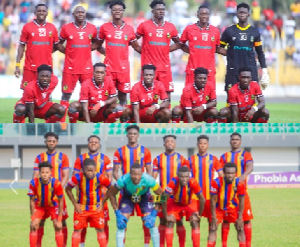Panelists at a forum organised in Accra as part of the third National Constitution Week celebration on Monday cautioned against the political development in the country where the electorate climb on the bandwagon of parties in power as demonstrated in recent by-elections.
The panellists noted: "Winning party sympathisers, media practitioners, civil society organisations and entire democratic forces should not jubilate over the winning spree of the ruling New Patriotic Party (NPP), but should lament over the losses of the National Democratic Congress (NDC) as the development has the potential of plunging the country into a one party state."
The panellists, mainly officials from the Ghana Immigration Services, Ghana Police Service, Prison Services, political party representatives, Supreme Court judges, students and civil society organisations, were contributing to the main lecture theme: "A Decade of Constitutionalism in Ghana - Strategies for Consolidation".
The National Commission for Civic Education (NCCE) is organising the week to create an increased and sustained interest and participation of all Ghanaians in the new democratic dispensation to achieve good governance, social and political stability for national unity and development.
It will also be used to assess 10 years of constitutional rule, pitfalls and challenges with a view to strengthening good governance through effective and resourceful democratic institutions and civil society.
The panellists and participants exposed the dangers of a one party state and appealed to all democratic forces and political party operatives to intensify public education on the benefits and beauty of multi-party democracy.
In a paper presented on behalf of Professor Emmanuel Gyimah-Boadi, Executive Director of Ghana Centre for Democratic Development (CDD-Ghana), he decried the creeping political and religious intolerance in the society, saying it posed a threat to constitutionalism.
"This negative culture is reflected especially in the lack of or extremely low levels of sympathy for opposition parties and dissenting voices in Ghana," stressing, "this culture was evident in the rapid disappearance of
NDC flags from the windscreens of taxis almost immediately after the party lost the elections."
Prof. Gyimah-Boadi said the sharp reversal of support for the NDC soon after leaving power and the popular identification with the ruling NPP and the natural tendencies to go with the winner appeared to be carried to extraordinary heights in Ghanaian politics.
"This opens the question of who will stay in the opposition to undertake the important democratic task of keeping the government on its toes."
The CDD-Ghana Director, whose speech was read on his behalf by Dr Baffour Agyeman Duah, Associate Director of CDD, identified the huge deficits in civic competence and political efficacy in the country as another threat to Ghana's constitutionalism.
This, Prof. Gyimah-Boadi said, is amply reflected in the paternalistic, supplicatory and sycophantic attitudes to persons in authority and indeed to those with favours and largesse to dispense.
He also described the hybrid of the Westminster and the American system of government, which mandates the President to draw the majority of his ministers from Parliament but at the same time prohibits carpet crossing as a flaw in the Constitution with the possibility of creating a constitutional logjam.
"Our democratic constitutionalism is also faced with threats inherent in a constitution that fosters 'hegemonic Presidency,' where the President is granted vast appointing powers, with no ceiling on the number of appointments he could make to the Supreme Court and the number of ministers he could appoint and has near monopolistic control over the public purse.
General News of Wednesday, 30 April 2003
Source: --












